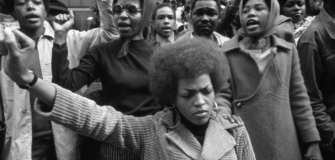Mardi Gras and Beyond: How Black Women Have Shaped the Culture of New Orleans
Share
Mardi Gras is coming up and as people all around the world come to experience the magic of New Orleans, few people know just how much of that magic is influenced by Black women. We often associate colorful beads, costumes, king cakes, and second-lines with New Orleans. Girl’s Trip, Solange, Essence Fest, and Mardi Gras cause FOMO. New Orleans is so much more as it represents resilience, history, and class, also some qualities that represent what it means to be Upspoken. If you’re working hard for the money and can’t partake in all the festivities – because some of us Upspoken women have to miss out – we have a few gems to help you connect with and understand Black women’s influence on N’awlins culture including Mardi Gras, food, and voodoo.
What it Means to be Seen and Upspoken
Women were not always welcomed to participate in Mardi Gras. There were some Upspoken women who worked hard to change that and their desire to be seen is reflected in today’s celebration of Mardi Gras. Women were originally not allowed to parade during Mardi Gras, but that changed with Miriam Batiste Reed. Reed became known as a “Baby Doll” after becoming one of the first women to parade in Mardi Gras. Baby Doll is a tradition that dates back to 1912, during Jim Crow, when the sex industry was legal for white customers in Storyville, New Orleans, while Black customers had to go a few blocks away from where the same activity was deemed illegal. These Upspoken women decided to get creative to be seen and thus the Baby Doll costume and a new dance step called “Walking Raddy” emerged. In 1922, the Krewe of Iris was formed and in 1941, The Krewe of Venus formed and became the first all-women parade where it rained and they had rotten vegetables thrown at them by men who weren’t happy with their participation. These women did not allow their voices to go unheard and they created their own opportunities to express themselves and be represented at times when society told them it wasn’t possible.
Preserve Black History and Create Your Own
Soul food is Black history and food is life in New Orleans. If you want to eat right and be entrenched in Black history, Dooky Chase is the place to throw down. Owned by Leah Chase, the “Queen of Creole” and advocator for African American Art and Creole cooking, Dooky Chase was a well-known gathering place during the 1960s for those who participated in the civil rights movement. Dining at Dooky Chase is not just about food, it’s a Black cultural experience. This woman turned her passion into her career and provided opportunities for people in her community with jobs and advocacy. If that isn’t empowering enough, even the floods of Hurricane Katrina couldn’t hold this Upspoken woman down, because two years after the flood she reopened the doors of Dooky Chase, reinforcing her own mark on Black history.
Honor Your Ancestors and Live Boldly
We can’t reflect on New Orleans traditions without talking about Voodoo. After all, it is home of the Historic Voodoo Museum. New Orleans Voodoo derives from traditions of the African diaspora brought to French Louisiana by enslaved Africans from West Africa. Notable Voodoo priestesses are Ava Kay Jones, founder, and performer of the Voodoo Macumba Dance Ensemble, Chief Sharon Caulder, Founder of Chez Vodoun, and Priestess Miriam Chamani, founder of the Voodoo Spiritual Temple. Voodoo has made a resurgence in popular culture as people take their path of enlightenment and define what it means to have a spiritual connection. Voodoo isn’t just dolls and candles so be careful and do your research, the goal is to connect with ancestors not summon the demons.
There so much about New Orleans to love and so little time. If you haven’t been, reading this should make you want to book a trip ASAP. A city as magical, unique, and resilient as New Orleans, it’s not hard to understand the influence of Black women.
If you’ve been to New Orleans tell us about your experience and if you’re planning to go let us know what you’re looking forward to in our comments.




Follow Us